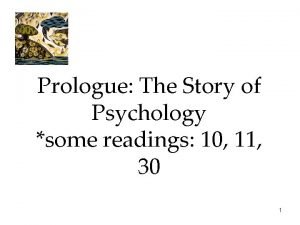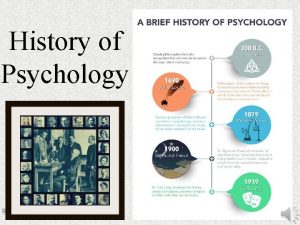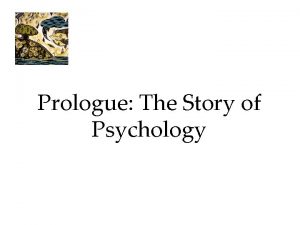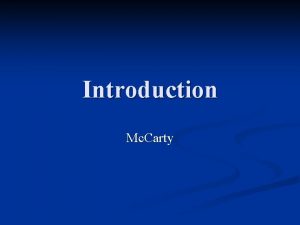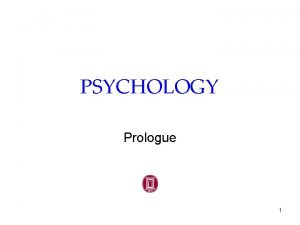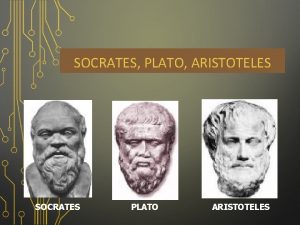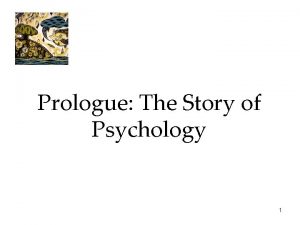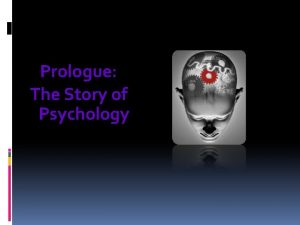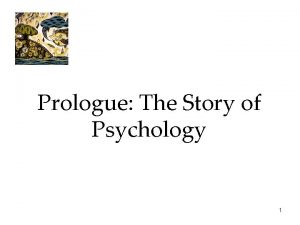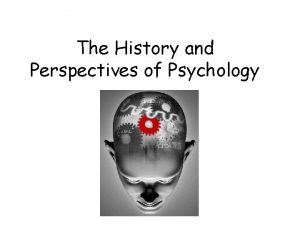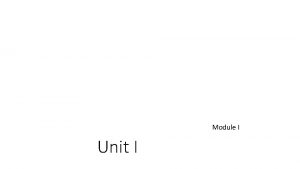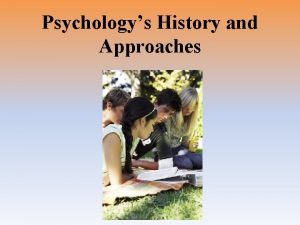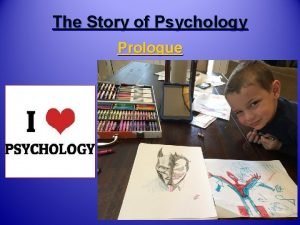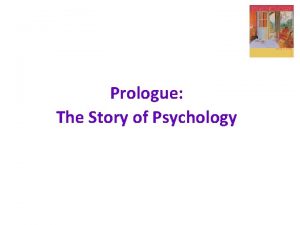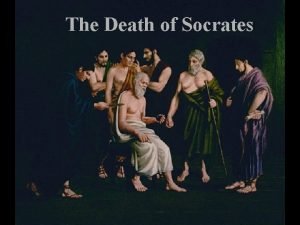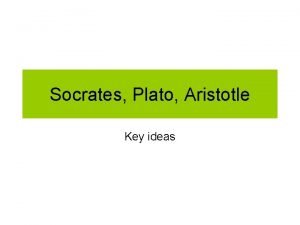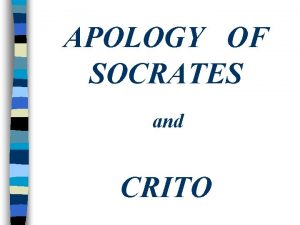Prologue THE STORY OF PSYCHOLOGY Prescientific Psychology Socrates


















- Slides: 18

Prologue THE STORY OF PSYCHOLOGY

Prescientific Psychology Socrates and Plato-Viewed mind as separate from body and argued some ideas are innate (Dualism) Aristotle – ◦ Mind and body are connected, not separate ◦ Observation ◦ Knowledge not innate, knowledge grows from our experiences René Descartes – agreed with Socrates and Plato about innate ideas & the mind being distinct from the body but believed the two do interact (Interactive Dualism)

Prescientific Psychology Empiricism – Idea that knowledge comes from experiences via the senses and science should be based on knowledge from experimentation and observation Francis Bacon – one of the founders of modern science, • relied on common sense and experiments • studied how the brain always looks for patterns and for confirmation John Locke – Tabula Rasa – The mind is a blank slate on which experience writes

Wilhelm Wundt • Opened first psychological lab in Leipzig, Germany in 1879 • Sought to measure the fastest and simplest mental processes (reactions to sensory stimuli) • Developed Introspection technique – look inward to measure conscious experience

Edward Bradford Titchener • Student of Wilhelm Wundt • Introduced Structuralism –the idea that conscious experiences could be broken down into structures or parts – explore the elemental structure of the mind • Interested in showing how these parts were interrelated • Realized that introspection was not reliable – results vary from person to person

William James • Physiology teacher at Harvard but focused more on psychology • Wrote 1 st psychology textbook Principles of Psychology • Thought it more beneficial to study how consciousness serves a purpose • Functionalism – focused on how mental and behavioral processes enable the organism to adapt, survive, flourish • Relied on natural observation not introspection • Followed the work of Charles Darwin and natural selection

Legacy of William James Mary Whiton Calkins • Student of James • Finished all work for Ph. D. but Harvard would not endorse, refused to accept degree from Radcliffe College • Later became 1 st woman president of APA Margaret Floy Washburn • Student of Titchener • First woman to receive Ph. D. in psychology from Harvard • 2 nd woman president of APA • Wrote The Animal Mind, which influenced the school of behaviorism

Sigmund Freud • Best known and most controversial. • Believed we are motivated by unconscious instincts & urges that are not available to the conscious mind • Psycholanalyst – a psychologist who studies how unconscious motives and conflicts determine human behavior • Free Association – patient says whatever comes to mine • Dream analysis – applied the same concept to dreams

John B. Watson • Behaviorists in 1900’s questioned the role and study of consciousness through placing an importance on observable behavior • This led to a scientific approach and psychology focusing on the science and study of behavior • Focused on how environmental stimuli could shape behavior • Dismissed the use of introspection

B. F. Skinner • Leading Behaviorist who rejected introspection and studied how consequences shaped behavior Focused on the role of reinforcement and punishment on directing behavior

Carl Rogers & Abraham Maslow • Humanistic psychology – Emphasized the growth potential of healthy people; used personalized methods to study personality in hopes of fostering personal growth • Emphasized the importance of current environmental influences on our growth potential and the importance of meeting our needs for love and acceptance • Focused on how free will and human desire and potential could shape behavior • Believed that human potential is what separates humans from animals

Psychology’s Big Debate • Nature-nurture controversy - the longstanding controversy over the relative contributions that genes and experience make to the development of psychological traits and behaviors • Natural selection – (Darwin) Nature selects those that best enable an organism to survive and reproduce in a particular environment

Three Main Levels of Analysis - The differing complementary views, from biological to psychological to social-cultural, for analyzing any given phenomenon Biopsychosocial approach – ◦ Provides vantage points for looking at a behavior ◦ Considers the influences of biological, physical, and social-cultural factors ◦ Offers a more complete picture of any given behavior or mental process


Psychology’s Current Perspectives Perspective Focus Sample Questions Neuroscience How the body and brain enables emotions? How are messages transmitted in the body? How is blood chemistry linked with moods and motives? Evolutionary How the natural selection of traits the promotes the perpetuation of one’s genes? How does evolution influence behavior tendencies? Behavior genetics How much our genes and our environments influence our individual differences? To what extent are psychological traits such as intelligence, personality, sexual orientation, and vulnerability to depression attributable to our genes? To our environment?

Perspective Focus Sample Questions Psychodynamic How behavior springs from unconscious drives and conflicts? How can someone’s personality traits and disorders be explained in terms of sexual and aggressive drives or as disguised effects of unfulfilled wishes and childhood traumas? Behavioral How we learn observable responses? How do we learn to fear particular objects or situations? What is the most effective way to alter our behavior, say to lose weight or quit smoking?

Perspective Focus Sample Questions Cognitive How we encode, process, store and retrieve information? How do we use information in remembering? Reasoning? Problem solving? Social-cultural How behavior and thinking vary across situations and cultures? How are we — as Africans, Asians, Australians or North Americans – alike as members of human family? As products of different environmental contexts, how do we differ?

 Prologue the story of psychology
Prologue the story of psychology Plato
Plato Mumbilli
Mumbilli Hình ảnh bộ gõ cơ thể búng tay
Hình ảnh bộ gõ cơ thể búng tay Lp html
Lp html Bổ thể
Bổ thể Tỉ lệ cơ thể trẻ em
Tỉ lệ cơ thể trẻ em Gấu đi như thế nào
Gấu đi như thế nào Chụp phim tư thế worms-breton
Chụp phim tư thế worms-breton Chúa yêu trần thế
Chúa yêu trần thế Các môn thể thao bắt đầu bằng tiếng chạy
Các môn thể thao bắt đầu bằng tiếng chạy Thế nào là hệ số cao nhất
Thế nào là hệ số cao nhất Các châu lục và đại dương trên thế giới
Các châu lục và đại dương trên thế giới Công thức tính độ biến thiên đông lượng
Công thức tính độ biến thiên đông lượng Trời xanh đây là của chúng ta thể thơ
Trời xanh đây là của chúng ta thể thơ Mật thư anh em như thể tay chân
Mật thư anh em như thể tay chân Làm thế nào để 102-1=99
Làm thế nào để 102-1=99 Phản ứng thế ankan
Phản ứng thế ankan Các châu lục và đại dương trên thế giới
Các châu lục và đại dương trên thế giới
